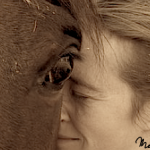An open letter
| December 16, 2010 | Posted by Melinda under Uncategorized |
I wanted to share with my readers an e-mail I wrote for my favorite e-mail list – the yahoo new100milers list.
It’s that time again – time to inject Farley’s hocks. I got 8 1/2 months from the last set of injections and probably could have stretched it out another 4-6 weeks, but standing in the mud and the cold for 3 weeks hasn’t helped. On Monday near the end of my dressage lesson, she started to pop her should out going to the left on a trot circle and be quite fussy. She’s often fussy, but there’s a certain kind of fussy, paired with resistence that is her telling me it’s time to do the hocks. On the trail it’s taking longer for her to warm up. During the jump lesson yesterday, she was jumping very well, which suprised me – she loves jumping and was probably just jumping through the pain – but there were still indicators it was time – short strided on the left hind during the trot, not wanting give me decent transitions (which require weighting the hindquarters).
I wrote this to Ann, who had asked me about my experience with injecting. I know most of you *lived* this with me as I fretted and worried over this issue in the early spring, but I think it’s worth re-stating my current philosophy.
Ann –
It’s been a really positive thing for me and Farley. Once it was said and done, once I had made the decision, after the injections, I had a new horse. In my opinion, it was one of the single best things I’ve ever done for my horse. Doing it forced me to set aside my pride and evaluate objectively what was best for my horse based on the scientific evidence available and the advice of a vet I trusted.
If you want to read about some of the agony I went through trying to make this decision, go back and read my blog posts from march and early April. The hardest part was dreading what people would think of me for keep my horse sound with a needle. After talking to my vet I used for this (a top lameness vet in the area) I felt differently about the decision. He said that fusing of the hocks was something that naturally occurred and there was likely not any management changes that would have produced a significantly different result. Similarly, there isn’t anything (in his opinion) on the market that can be given orally that is as cost effective or effective as hock injections.
The best way of keeping her sound for as long as possible is to continue to ride her – which I cannot do if there is a continuing cascade of inflammation in the joint. Controlling inflammation is so important – inflammation and pain are NOT your friend. I used to think that if the horse was a bit sore, that the pain would keep them from “over doing” it. After talking to the vet and doing some of my own research, I have come to understand that although the former seems intuitive, keeping inflammation (and thus pain in some cases) low/controlled is paramount for the continued health of the horse.
I also asked the all important question – by making the pain go away and continuing to ride, will I do further damage to this horse because I am using artificial means to keep performing? The answer was an unequivocal no – To the contrary, the way to keep inflammation low and the joint healthy was movement – and injections reduce the inflammation so the joint or system can keep moving.
One thing to remember is that xrays changes do not correlate well to amount of lameness you may be experiencing. The left hock (the worst one) showed very little change, however my horse is also very wimpy (which I like!). She had very typical movement of a horse with fusing hocks. I felt guilty for waiting as long as I did to inject. She moved so much better and was so much happier – it was truly the right decision for us.
Another little note – the soreness showed up in the dressage much earlier than anywhere else, so now I use that as my warning sign – if she starts to struggle at collected trot on a circle, I start looking at possibly injecting. I don’t wait for it to show up on the trail.
One reason I am so open about my experience is that so many people aren’t. Many many many top horses are injected in this sport and no one wants to talk about it. so here’s my philosophy about injecting and other meds now: I do the best I can, but sometimes confo, life, and being human means things don’t go perfectly. When that happens, as long as I am doing no harm (making something worse in the long run) – then the decision is easy – I’ll do the intervention that gives her the most comfort and keeps her active, until she lets me know she wants to retire.
So I inject when I need to, and after a hard work out I may even pop a bute tab or two to keep inflammation down. *shrug* It’s working so far. I think it’s a good compromise between compromising my horse for my ideals (and trust me – I still don’t like the fact it takes a needle to make her comfortable) and keeping her sound and happy for a sport she loves.
I know this is a bit controversial, but please be nice – I’ve NOT had a good time at work this week, it has poured for the last 24 hours and I STILL haven’t unloaded hay or trimmed feet. Oh – and I’ve gorged on candy my trainer brought back from Hawaii for me – which is an incredible sugar rush when all I’ve had a paleo diet for the past week or so.
Melinda










You guys are always so great and know exactly what to say! Yes, I totally agree that it’s wonderful that we get to make our own decisions regarding our horses. I think one thing I’ve gotten a lot better about this year is not worrying so much what others think.
I don’t understand why people get up in arms over hock injections – they’re the treatment, not the problem. The problem is horse cultures that promote riding horses too hard or too young, leading to early arthritis in many of them. (Hi there, western pleasure.) That’s what’s unethical, not the shots. If you’ve done all you can to treat your horse right and they develop problems anyway, use whatever treatment is best for your horse without shame. And best wishes to the both of you!
I still haven’t injected any joints on Chief and am not sure how I’d feel about doing that.
I’d rather see riders maintaining their horses so they can keep using them than to see the horses not be used and go to waste. I think a working endurance horse is so much better off than a horse that loves the trail sitting around doing nothing.
I have read that injecting hocks alters the fusing process and isn’t always the best thing in the long run for the horse. Different vets have different opinions on that so it’s all very confusing.
I’m glad we all have the right to make the choices we feel are best for our own situation. Good luck with the new ride season! Karen
I think it’s completely reasonable to do what it takes to keep our horses competing happily and comfortably — you’re definitely one of those that would not be competing her horse if she weren’t happy, so I don’t think it’s just a matter of keeping her sound enough for YOU to do what YOU want.
My old guy needs a little help after 222 races… I tried hock injections for a while but found that oral supplements and Adequan IM were just as, if not more, effective than IA injections, and less risky… Right now he’s telling me he wants to take it easy for the winter, but he still LOVES having a job. He would be miserable if I opted not to take advantage of the technology available to me, and let him rot in a pasture instead. And if he sat in a field all day, he would get more and more lame until he was probably beyond the point of any help short of bionic implants.
Like you said, I do the best I can… But I can’t do anything about the first 10 years of my horse’s life. I just try to manage him well enough that he’s sound and comfortable for the next 10+ years too.
Though new to the sport if there is one thing I disagree with is the mentality against “treating” our horses. I don’t believe in masking injury for the sake of competition, but if treating your horse keeps their body closer to the goal of “health” vs. degenerative disease, then treat I will. Probably the reason you feel this angst is because you feel somewhat boxed in by the rules or at least the mentality of non-medicated horses in this sport. The only way it could be fairly monitored would be if all competitors were drug tested every time, so to some degree we have an honor system going on.
Inflammation is the ultimate enemy. If you can legally deal with it, I say go for it. You know your horse best.
Sometimes it is necessary to take extra measures to keep our athletes performing at the top. You are asking her to do extraordinary things for you athletically, why not provide the best science can provide in keeping her sound and comfortable?
Injecting hocks isn’t a miracle cure, it won’t keep her from getting injured. It isn’t cheating. Don’t be so hard on yourself for doing the best for your horse!